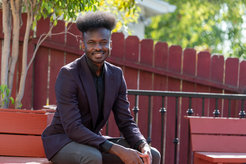Ibrahim Cissé receives 2021 MacArthur Fellowship
Max Planck scientist recognized for pushing the limits of imaging methods to investigate the subcellular processes underlying genetic regulation
Ibrahim Cissé is MacArthur Fellow 2021. He won a generous no-strings-attached fund to advance his innovative research. Cissé and his laboratory develop single-molecule super-resolution imaging tools and apply them to investigate subcellular processes in living cells. The Cissé lab, which recently moved to the MPI Freiburg, studies transient, loosely joined groups of biomolecules at high spatial and temporal resolutions. These investigations deepen our understanding of how gene regulation and expression produce proteins in cells.

Ibrahim Cissé, biophysicist and new Director at the Max Planck Institute of Immunobiology and Epigenetics, was selected as a recipient of the 2021 MacArthur Fellowship. Often referred to as “genius grants,” these fellowships are awarded annually by the John D. and Catherine T. MacArthur Foundation to talented individuals in various fields, ranging from scientists to artists and entrepreneurs.
The grant is an exceptional honor reflected in a 625,000 dollars (≈ 550,000 euros) “no-strings-attached” funding over five years. Recipients may use the financial support of the fellowship to advance their expertise, engage in bold new work, or, if they wish, to change fields or alter the direction of their careers, as the MacArthur Foundation states.
“Stunned, humbled and honored to be named a MacArthur Fellow. The scientist is but whom their community makes them to be. My village are my students, trainees, mentors, colleagues, collaborators, staff, friends, family as well as strangers. What an incredible honor…, “ said Director Ibrahim Cissé.
The MacArthur foundation chooses fellows from recommendations from external nominators across a vast breadth of fields who draw on their expertise to recommend creative, innovative leaders who may be on the precipice of a great discovery or a game-changing idea.
Illuminating the dynamics of gene regulation
With his innovative approach to combining physics, chemistry, and biology in one department, Ibrahim Cissé pushes the limits of advanced single-molecule super-resolution imaging techniques and quantitative microscopy. His efforts illuminate the dynamics of gene regulation and enable further investigation of biological condensates.
Among previous research achievements, Cissé and his team were able to show by modifying existing high-resolution imaging methods that RNA polymerase II (Pol II), a key molecule that transcribes genetic information from the DNA into mRNA, forms temporary clusters at specific gene sites. Furthermore, they discovered that the duration of the RNA polymerase cluster predicts the number of mRNA molecules that are subsequently made.
Ibrahim Cissé, Biological Physicist | 2021 MacArthur Fellow
In the following studies, Cissé shed new light on the physical mechanisms used by RNA polymerase II. He demonstrated that clusters of these molecules have all the defining characteristics of biomolecular condensates formed by a phenomenon called liquid-liquid phase separation in which liquid parts of a cell without a membrane separate and form distinct structures, similar to how oil droplets behave in water. Phase separation has recently emerged as a universal principle of cellular organization, underlying many biological processes, the list of which is growing rapidly.
The foundation highlights that with his cutting-edge innovations in single-molecule microscopy and in-depth investigations of biophysical and cellular processes, Ibrahim Cissé has deepened our understanding of the dynamics behind the regulation of gene expression in cells. He also enables further investigation of biological condensates, which may be critical to understanding cancer or neurodegenerative diseases such as Parkinson’s.
This year’s class recognizes 25 new MacArthur fellows for extraordinary originality and dedication in their creative pursuits. The fellowship for Ibrahim Cissé is only the second time that this exceptional grant went to a Max Planck researcher, after Kirsten Bomblies (former member of the Max Planck Institute for Developmental Biology) in 2008.
About Ibrahim Cissé
Ibrahim Cissé was born in Niger and completed his PhD in physics at the University of Illinois at Urbana-Champaign (USA) in 2009. After a postdoctoral stay at the École Normale Supérieure of Paris (France), Cissé returned to the USA in 2013 to become a Research Specialist at Howard Hughes Medical Institute’s Janelia Research Campus in Ashburn, Virginia. In 2014, he moved to the Massachusetts Institute of Technology in Boston, where he was first an assistant professor of Physics and then promoted to associate professor in the Department of Physics with a joint appointment in biology. Ibrahim Cissé joins the MPI of Immunobiology and Epigenetics in Freiburg from the California Institute of Technology in Pasadena (USA) where he was appointed Professor of Physics in 2021. In Freiburg, he is head of the Department of Biological Physics. Ibrahim Cissé is the recipient of several scientific awards, including just recently the 2021 Vilcek Prize for Creative Promise in Biomedical Science.
The MacArthur Foundation
The John D. and Catherine T. MacArthur Foundation is one of the largest foundations in the USA and supports creative individuals, effective institutions, and influential networks, building a more just, verdant, and peaceful world. The MacArthur Fellows Program was established in 1981 and provides support for talented individuals with a stipend of 625,000 dollars over a five-year period, seen as an investment in the recipient’s originality, insight, and potential. Key criteria for selection are exceptional creativity, the prospect of advances based on a track record of significant accomplishments, and considerable potential to promote creative work with the stipend in the future. The purpose of the MacArthur Fellows Program is to enable grantees to exercise their own creative instincts to benefit human society. Grantees can include writers, scientists, artists, scholars in the human sciences, teachers, or entrepreneurs, provided they are American citizens or reside in the United States.













